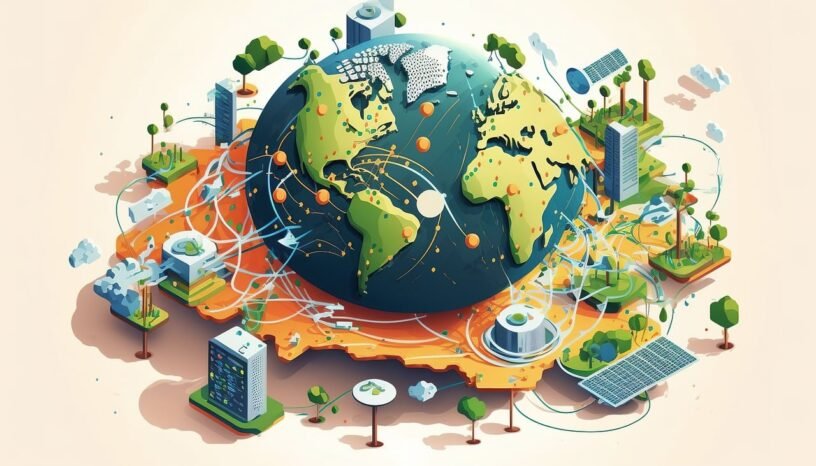The Internet of Things, or IoT, has developed into a disruptive force that affects many industries and opens doors for engineers. We will explore the most recent advancements in IoT in this extensive piece, talking about new gadgets, uses, and its significant impact on many industries. Additionally, we’ll explore how engineers can seamlessly transition into the IoT landscape, identifying the skills they need and the exciting possibilities that await them.
New Devices Shaping the IoT Landscape:
1. Smart Home Innovations: With the introduction of numerous smart devices, home automation has advanced significantly. Our homes are quickly becoming networked hubs with smart appliances such as security cameras, smart refrigerators, and lighting and thermostat controls. The advent of smart devices, such as security cameras and intelligent thermostats, has led to significant advancements in home automation. Companies like Nest have made significant contributions to this development.
2. Wearable Technology: These days, wearables are more than just fitness trackers. The most recent developments span a wide spectrum and include wearable medical technology, smart apparel, and augmented reality (AR) glasses. These developments actively support improvements in safety and healthcare in addition to improving individual convenience. Leading companies in the field, like Apple with their smartwatches and Microsoft with their augmented reality glasses, have been instrumental in pushing the limits of wearable technology.
3. Industrial IoT (IIoT) Devices: IoT is being adopted by industries to improve productivity and streamline processes. IIoT devices, which include sensors, drones, and networked machinery, enable data-driven decision-making and real-time monitoring in the manufacturing, logistics, and energy sectors. IoT adoption is essential for optimizing operations because it makes use of connected machinery, drones, and sensors to enable seamless real-time monitoring and well-informed decision-making.
Applications Redefining IoT:
1. Smart Cities: The concept of “smart cities,” which use IoT to improve urban living, is gaining traction quickly. Smart traffic management, waste management, and environmental monitoring are a few instances of how cities are using IoT to increase efficiency and sustainability. Investigate resources from groups like Smart Cities Council and IoT for Cities to learn more about smart city programs and technologies.
2. Healthcare Revolution: IoT applications like smart medical devices, connected health systems, and remote patient monitoring are revolutionizing the healthcare industry. These technologies are essential for preventive care in addition to facilitating prompt healthcare interventions. Look through the resources on sites like IBM Watson Health and Philips Healthcare for a thorough investigation of IoT applications and technologies in healthcare.
3. Precision Agriculture: Precision farming in the agricultural industry is becoming increasingly dependent on IoT. Farmers can increase agricultural productivity by monitoring crops efficiently, optimizing irrigation, and leveraging drones and connected equipment. For a thorough grasp of precision agriculture solutions, explore the resources offered by prominent industry players like John Deere and Trimble Agriculture.
Impact on Various Industries:
1. Retail Transformation: Personalized shopping, supply chain optimization, and inventory management are just a few of the many uses for which retailers are utilizing IoT. The retail landscape is changing due to the integration of beacons, RFID technology, and smart shelves. Use helpful insights from resources like IoT in Retail and the NRF (National Retail Federation) to stay up to date on the most recent developments in retail IoT.
2. Manufacturing Efficiency: With IoT-enabled predictive maintenance, real-time production line monitoring, and improved supply chain visibility, the manufacturing industry is undergoing a dramatic transition. These developments lead to a significant rise in productivity and a decrease in downtime. Examine the materials and case studies offered by market leaders like Cisco IoT Manufacturing and Siemens Digital Industries Software to obtain a deeper understanding of the manufacturing of IoT solutions.
3. Energy Management: Through the use of smart grids and connected devices, IoT is essential to optimizing energy consumption. This encourages sustainable energy practices while also giving consumers more control over how much energy they use. Consult important resources from organizations like the World Economic Forum – Energy Transition to stay up to date on the most recent developments in energy IoT.
Transitioning into the IoT Realm:
1. IoT Ecosystem and Fundamentals: Start with online courses on platforms like Coursera or edX offering courses on IoT fundamentals.
2. Programming and Development: Enhance your programming skills with resources from Codecademy or freeCodeCamp.
3. Data Analytics and Machine Learning: Explore data analytics and machine learning courses on Udacity or DataCamp.
4. Connectivity Technologies: Understand connectivity technologies through resources like the IoT Developer Center by ARM.
5. Cybersecurity Principles: Strengthen your cybersecurity knowledge with courses from platforms like Cybrary or Coursera – Cybersecurity Specializations.
6. IoT Platforms and Tools: Explore IoT platforms with documentation and tutorials from providers like AWS IoT Documentation and Google Cloud IoT.
Interdisciplinary Knowledge: Enhance your interdisciplinary knowledge by reading academic papers, attending conferences, and participating in forums like IoT Community.
The Engineer’s Path to Impact:
1. Smart Infrastructure Development: Gain insights into smart infrastructure development through case studies and reports from organizations like the Smart Cities Dive platform.
2. HealthTech Innovations: Stay updated on HealthTech innovations by exploring resources such as HealthTech Magazine and MobiHealthNews.
3. Industrial IoT (IIoT) Applications: Learn about IIoT applications in manufacturing through case studies from organizations like the Industrial Internet Consortium.
To Summarize, The Internet of Things is a revolution that is changing how we work and live, not just a technological advancement. By developing a broad skill set, engineers looking to enter the IoT space can position themselves as change agents. Programming, data analytics, security, and multidisciplinary expertise are prerequisites for success in this dynamic field, where engineers can contribute to the creation of intelligent and networked solutions that will influence industries in the future. Engineers have an abundance of opportunities to explore the IoT frontier and realize their full potential in this rapidly changing environment. Take a look at the suggested resources to get started in the IoT space.
Happy Advancement !




3 Pingbacks